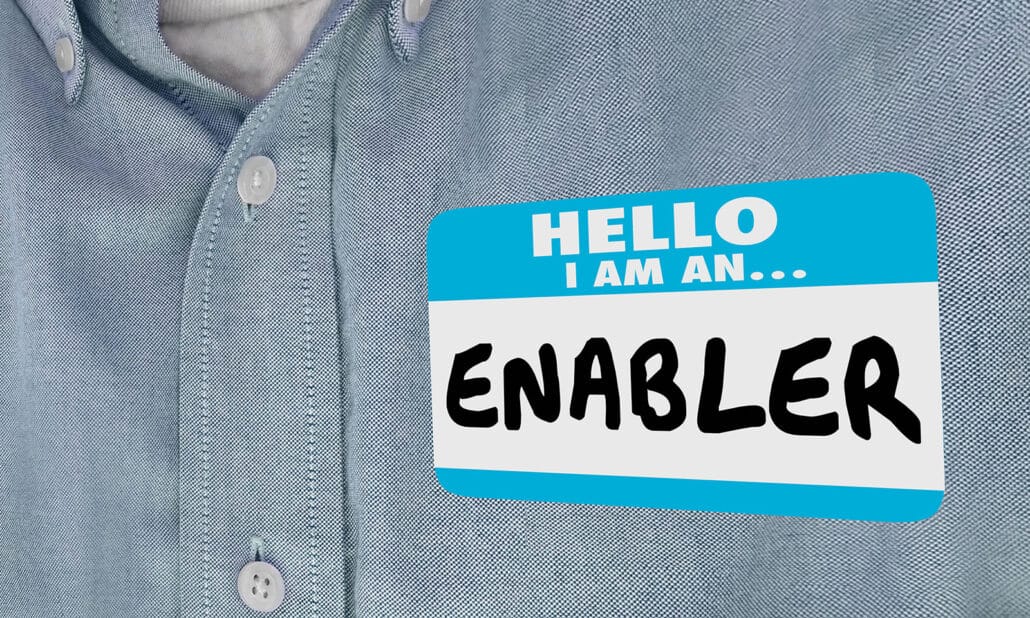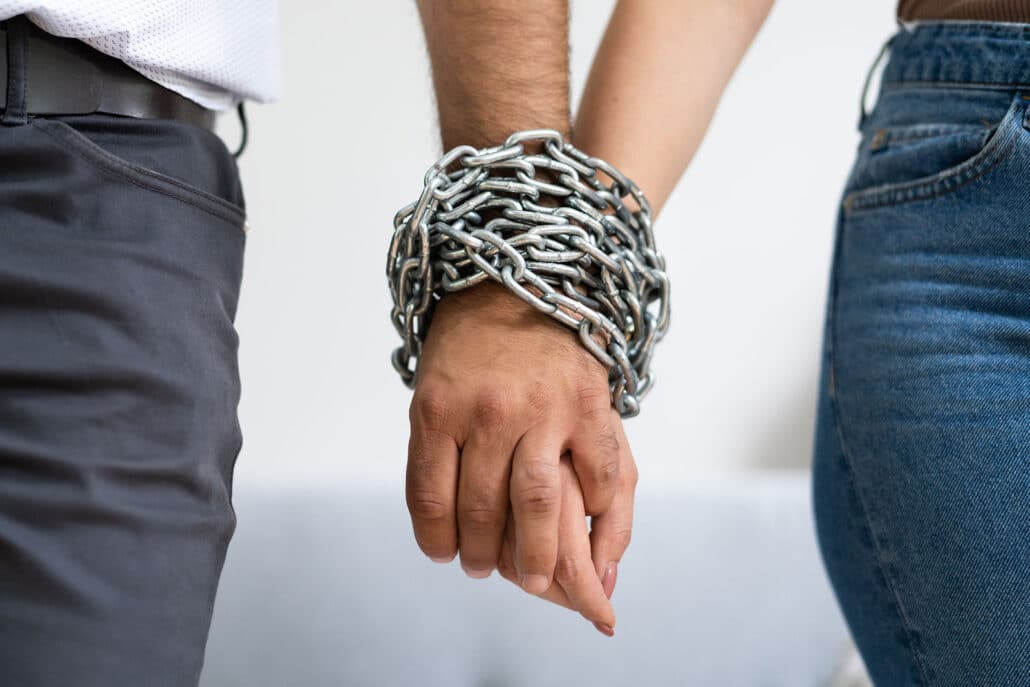Substance dependency is linked to various mental and emotional issues. But even if you’re not the one abusing drugs, you can still suffer from many psychological and physical problems.
As a matter of fact, studies show that drug and substance abuse leads to many relationship issues, including couple burnout when caretaking turns into codependency.
Being close or in a relationship with someone struggling with addiction can negatively impact your emotional and mental health. It also leads to codependency and enabling issues.
As the person becomes dependent on a drug, their relationships start to collapse. Family, friends, and co-workers hurt to see someone suffer, but they might not know the best way to help them. Offering help in the wrong way can lead to enabling behavior in codependent relationships.
This article will explain the meaning of codependency and enabling behaviors, why they happen, and how to overcome them. So, let’s dive in.

Table of Contents
What is Codependency?
Codependency is a pattern that characterizes unhealthy and abusive relationships. In codependent relationships, one person prioritizes the needs of the other in a harmful way.
It’s not like caring for someone, because in a codependent relationship, one person will sacrifice their well-being, neglect their desires, and even harm themselves. At the same time, they’ll feel responsible for the other person’s happiness and comfort.
Codependency often leads to resentment. One person initially attempts to help the other but ends up losing themselves trying to meet their desires while neglecting their own needs.
When they feel that their efforts aren’t appreciated, they might resent the codependent person. Moreover, the person receiving help might demand more support and eventually take this support for granted.
What is Enabling?
Enabling behavior happens when one person wants to help another, but instead, reinforces an unhealthy behavior. These actions unintentionally support problematic behavior, although usually done in good faith.
Instead of helping someone overcome an issue, an enabler usually impacts their ability to recover. The person with the substance or behavioral problem doesn’t face the consequences of their actions and might not seek help.
What is the Relationship Between Codependency and Enabling?
Enabling is a sign of codependency. In a codependent relationship, one person can’t survive without the other. The person becomes an enabler when they try to find excuses for the person with behavioral issues or suffering from a substance abuse disorder. This behavior creates an environment where a codependent relationship can flourish.
Codependent relationships might not be related to substance abuse, but occur when one person needs more support. For example, a person with mental issues like bipolar disorder might get into a codependent relationship where their partner or spouse handles more responsibility.
Living with someone who has a substance abuse issue doesn’t necessarily mean that you’re in a codependent relationship. Many people can escape codependency when they know how to draw healthy boundaries. However, partners with low self-esteem might get into a vicious abuse cycle.
What are Signs of Codependency?
A codependent relationship is an unhealthy interaction, where one person compulsively tries to meet the needs of the other. In the beginning, one person might try to do this to make the other happy, but it can lead to resentment and stress when the recipient keeps asking for more.
If you know someone who has a substance abuse problem, you might be in a codependent relationship if you display any of the following patterns.
- You always put the other person’s needs above yours.
- You have no friends or hobbies away from them. In some cases, they’re the only friend you have.
- You don’t mind dropping and losing everything for them, even if it involves harming you.
- You don’t hold the person accountable for their problematic behavior.
- You ignore your partner’s problematic behavior.
- Your relationship lacks healthy boundaries.
- You feel angry when the other person ignores your offers of help.
What are Signs of Enabling?
Enablers usually mean to help but their actions can hinder healing and recovery. For example, a partner who makes excuses for an alcoholic partner or someone who abuses drugs won’t encourage them to seek help.

Instead, they might show them that there’s nothing wrong with their behavior. As a result, the person with the issue will continue to abuse drugs or drink in excess.
If you know someone who has a drug or alcohol problem, you might be an enabler if you display any of these behavioral patterns.
- You don’t communicate openly with the person abusing drugs or alcohol as you try to avoid problems.
- You try to cover up their addiction.
- You hide their substance abuse from authority figures and family members.
- You make excuses for their behavior.
- You avoid having conversations with them regarding their substance or alcohol consumption.
- You blame others for the person’s substance abuse issue.
How Can You Break the Cycle?
Codependency and enabling will harm both parties involved in a relationship. One person will become too wrapped up in meeting the needs of the other, and the person with a behavior or substance abuse problem won’t get the help they need.
If you’re an enabler or in a codependent relationship, you might feel guilty if you try to break the cycle. You somehow feel responsible for the other person’s issues, and the extreme guilt and anger will prevent you from seeing the relationship for what it is.
A person with destructive behavior like substance abuse won’t seek recovery or help when they have a family member, partner, or friend who is always defending their behavioral issues.
Are You Helping?
As someone who lives with a spouse, partner, child, or sibling who deals with substance abuse, you might feel obliged to help them. People with addiction issues are more likely to recover in a supportive environment. But you should understand the difference between helping and enabling.
Defending a person with substance abuse, helping them blame others, and ignoring their responsibility is hindering their recovery.
In most cases, a person who has an alcohol dependency or drug abuse issue will suffer with their personal and professional relationships. They might drop out of school, quit work, become unable to pay bills and lose the support of their family and friends. These stressful situations encourage you to help them get their lives back together.
Yet, you should be aware of the risk of developing a codependent relationship, where the other person won’t try to put in any effort to fix their own problems. In this case, you become an enabler who is worsening their condition by preventing them from realizing the consequences of their behavior.
Understanding Your Responsibility
If you aren’t sure if you’re helping or enabling, you need to take a moment to think.
Are you defending wrong behavior?
Are you handling another person’s issues?
Are you not prompting them to seek help and recover because you’re worried about their reaction?
You should understand that abusing drugs isn’t your fault. The person with an addiction problem might try to blame you but this isn’t true.
As a result, fixing the problem isn’t in your hands. A person with a substance abuse problem won’t recover if they don’t want to. They have to actively seek professional help to be able to overcome their addiction.
You don’t want to turn your back on someone who is struggling with substance or alcohol abuse, but you need to draw clear boundaries between their life and yours. You can encourage your friend or family member to seek help and manage their problem instead of enabling their abusive issues.
Having healthy boundaries doesn’t mean abandoning a loved one they’re hurting themselves. You can seek professional intervention if they can’t take the step as this will help them get their lives back on track.
For example, if they’re threatening others or talking about suicide, you should call professionals to help this person before it’s too late.
What Should You Do?
Things can become too stressful when you’re close to someone with a substance or alcohol abuse issue. Yet, there are several things you can do to support them during their recovery journey.
- Understand the meaning of addiction and how it affects the brain and behavior.
- Know that you can’t control addiction because it’s a disease, but you can help someone recover by supporting them.
- Establish healthy boundaries within the relationship and learn to say no to the other person.
- Be consistent with your boundaries and rules, even if the other person pushes too hard.
- Don’t hold yourself responsible for the other person’s actions if you’re the caregiver during their recovery period.
- Don’t interfere with the other person’s legal or behavioral problems with others, if possible.
- Talk to the person about therapy and explain that the sooner the better.
- Make sure that you don’t get tempted to abuse illegal substances or alcohol yourself.
- Prioritize self-care for a healthy relationship.
- Try to remove any drugs or substances that might worsen addiction.
- Seek therapy to help you and the person with the substance abuse issue. Family therapy can help families overcome addiction issues successfully by addressing some problems that might trigger substance abuse.
Wrap Up
Living close to someone with a substance abuse problem can take its toll on you. Although you want to help this person recover, you must understand that their addiction isn’t your fault.
Codependency and enabling are common when you’re dealing with someone with a substance abuse problem. These behavioral issues usually start when you try to help them, but setting boundaries is essential. It’s also important to differentiate between offering help and becoming an enabler in a codependent relationship.
References
- https://www.ncbi.nlm.nih.gov/pmc/articles/PMC9905033
- https://www.ncbi.nlm.nih.gov/pmc/articles/PMC5115643
- https://www.ncbi.nlm.nih.gov/pmc/articles/PMC3985289
- https://www.ncbi.nlm.nih.gov/books/NBK571088
Published on: 2024-05-07
Updated on: 2025-03-13

